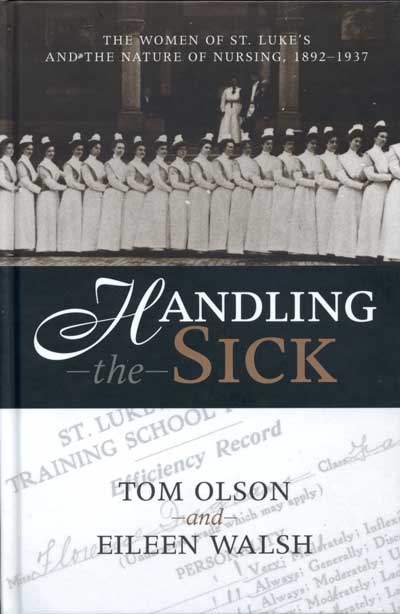|
Lavinia Dock Award for Best Book 2004 Handling the SickThe Women of St. Luke’s and the Nature of Nursing, 1892–1937Tom Olson and Eileen WalshWomen, Gender, and Health |
 2/26/2004 272 pp. 6x9  $83.95 cloth 978-0-8142-0959-2 Add cloth to shopping cart Shopping Cart Instructions Review/Change Shopping Cart & Check-out | |||
|
“It is rare that one reads a historical work that puts forward an entirely convincing argument, supported by solid evidence. Tom Olson's and Eileen Walsh's Handling the Sick is such a book. . . . [T]hey have written a penetrating and challenging book. One cannot but applaud their conclusion that until a resolution is reached between the university trained leadership and nurses who consider themselves skilled craftsmen, nursing will remain a conflicted occupation” —Nursing Inquiry “This is a provocative and important book that examines the historical formulation of nursing. It comes at a time when nurses all over the country face conditions in hospitals and clinics requiring a reorganization of their work, and a growing knowledge of health and illness.” —Julie Fairman, University of Pennsylvania “In this highly readable narrative, Olson and Walsh argue that nursing is a craft, rooted in the traditions of apprenticeship that valued practice over theory.” —Allison Hepler, author of Women in Labor: Mothers, Medicine, and Occupational Health in the United States, 1890–1980 Handling the Sick is the story of 838 women who entered the St. Luke’s Hospital Training School for Nurses, St. Paul, Minnesota, from 1892 to 1937. Their story addresses a fundamental question about nursing that has yet to be answered: is nursing a craft or a profession? It also addresses the colliding visions of nursing factions that for more than a century have disagreed on the inherent traits and formal preparation a nurse has needed. The women of St. Luke’s were engaged in the most practical of all occupations open to women, a rare one in which their strength, experience, and skill were prized above all else. They firmly believed that the key to success in nursing was apprenticeship training. Apprenticeship, not schooling, was the cornerstone on which all else rested. This study unites the opposing visions of those who led nursing towards professional status and those who saw it as a craft. Physicality, strength of will, an abiding emphasis on practicality, and a hierarchy based on a deep pride in craft skills have been essential elements of nursing. Nursing can look to its complex history to develop an integrated model of nursing, one drawing on both academic training and the immediate realities involved in “handling the sick.” Tom Olson is associate professor of nursing at the University of Hawaii. Eileen Walsh is an independent historian. | ||||

